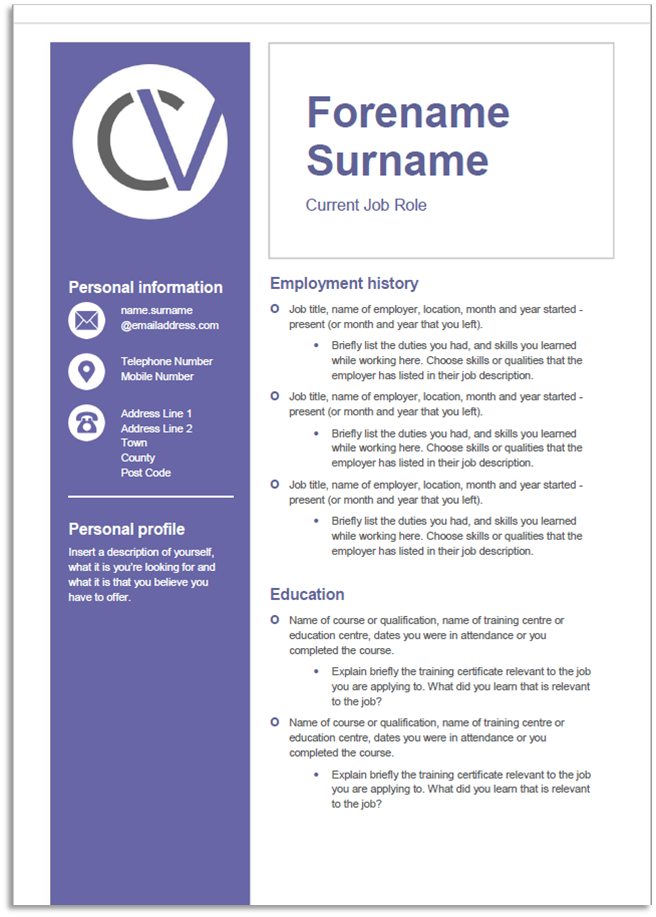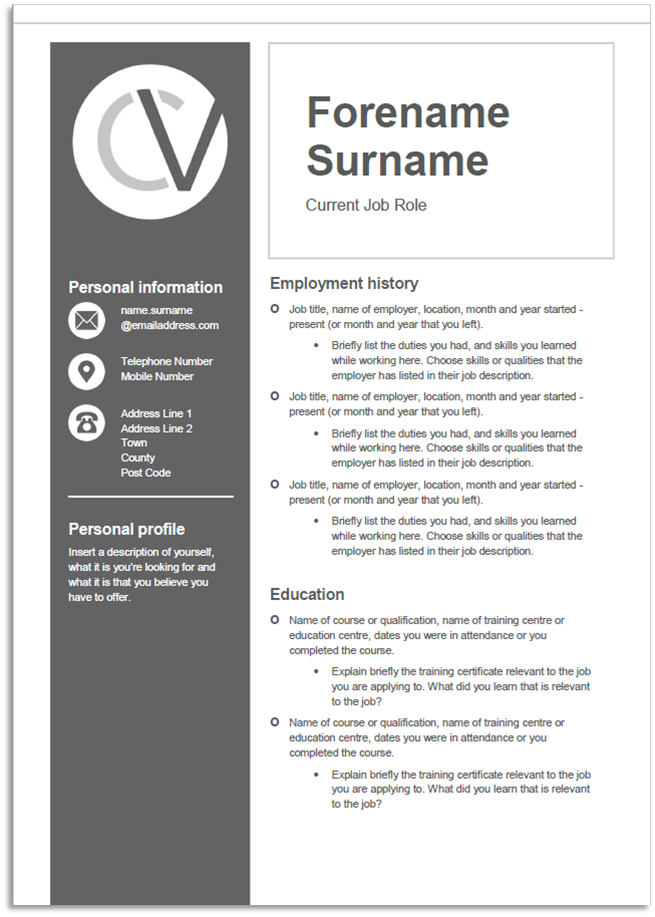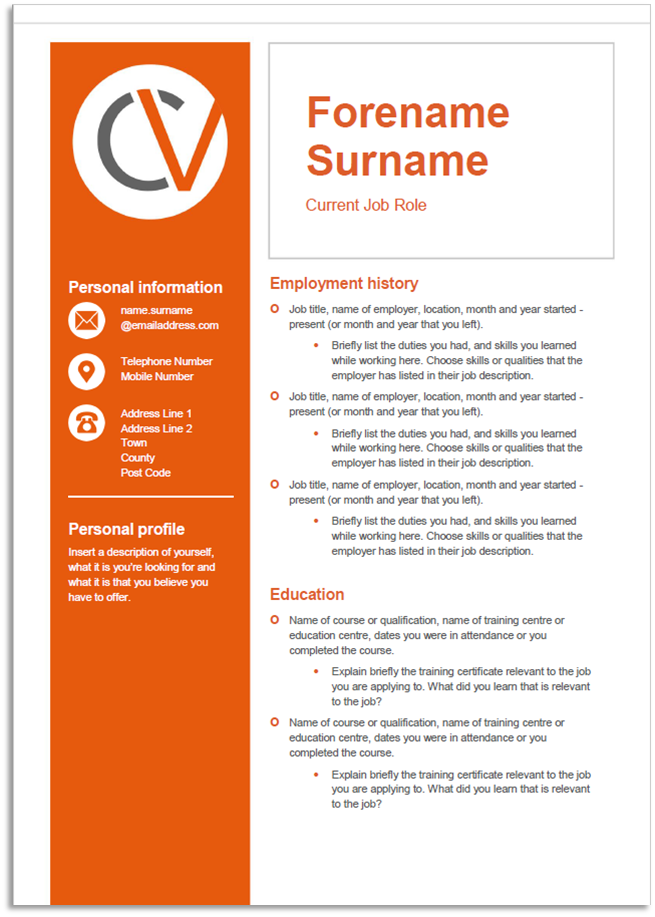If you have excellent attention to detail, able to work well in fast pace environment, and work well in a team, you’ll make a great Warehouse Operative, Production Operative or Assembly Operative.
Our free CV templates will help you write a tailored CV to ensure you stand out from the crowd.
A guide to writing a CV for a job as a Warehouse Operative, Production Operative or Assembly Operative
Tyler Summers
0000 0000 00
Tyler Summers@email.com
Home Street
Home Town
Postcode
Personal Profile
In the personal profile, you should professionally introduce yourself, in three or four sentences, with relation to the job you’re applying to.
Try to include: your current work situation, what type of work you are searching for (such as part-time, flexible hours, or full-time employment starting immediately) some key skills and/or traits that will show the potential employer that you are a good candidate for the advertised job.
EXAMPLE:
I am a hard-working and reliable individual with excellent attention to detail. I have three years’ experience working in the manufacturing sector, and have a full, clean UK driving licence. I am looking for a full-time role that will improve my skills and give me more responsibilities.
Work History
The work history section is to show the potential employer what jobs or work experience you’ve done. It is the first chance for you to highlight the skills and experience each one has given you, and this is turn should show why you are a good fit for the job you’re applying for. You don’t need to include every last detail, just pick the best parts. You can always write down and save your examples or other relevant skills for the interview.
- Job title, name of employer, location, month and year started – present (or month and year that you left)
- Briefly list the duties you had, and skills you learned while working here. Choose skills or qualities that the employer has listed in their job description
EXAMPLE:
- Production operative, DHL Express, Nottingham, October 2017 – present
- Responsible for unloading and recording new deliveries, and ensuring parcels are sent to the correct storage area. I also show new employees around the section and help them learn the ropes
What jobs should you include?
-
Try to include your work history for the last five years. If you haven’t been working for that long, that is okay. It will be explained by the education history. If you have recently moved to the country, it’s okay to include employment in other countries. There is more advice on work and education history in our top CV tips article.
-
Any jobs you’ve had in the Manufacturing and Production or Warehouse sectors will be useful to include here as lots of the skills will overlap and show you’re a good candidate for the role
- If you have recently left education, or are new to this type of work, try to include any jobs you’ve had that will highlight the skills the employer is looking for. For example, if you have worked on a shop floor stacking shelves, you could use this to show you have experience of receiving and organising stock
Education History
In education history, this is a chance to show any relevant training you have done, what skills you have learned from your courses, as well as general education subjects you’ve done. As you get more work experience, this section will become shorter, as your work history becomes more relevant and more recent.
There are no specific qualifications or education subjects required to be an Assembly Operative, Warehouse Operative or a Production Operative. However, a good level (GCSE or equivalent) of Maths and English would be useful.
- Name of course or qualification, name of training centre or education centre, dates you were in attendance or you complete the course
- Explain briefly the training certificate relevant to the job you are applying to. What did you learn that is relevant to the job?
EXAMPLE:
- First aid at work, British Red Cross Centre, Nottingham, August 2018
- Learned how and when to deal with specific illnesses in the workplace, and what do to if someone in injured while at work
Skills
Here is your chance to highlight the best skills you have in relation to the job you’re applying for. Hint: these will be the skills listed in the job advert, but only highlight the skills you have. Misleading information on your CV is likely to trip you up in an interview and is unprofessional; you don’t have to show you have every last skill listed in the job advert to be successful.
EXAMPLE:
- Target driven – ‘In my role at DHL I have improved my ability to focus on and meet performance targets. This has resulted in our section meeting and sometimes exceeding weekly workloads.’
- Working in a team – ‘I have been continuously improving my team working skills by making sure my section is communicating well with each other and other areas of the warehouse. This was especially important over the Christmas period when our workload was higher.’
References
First and last name
Job title and relation to you in the work place (if it isn’t obvious from the job title), name of work place, work contact number (or main company phone number which they can be reached through) and work email address
EXAMPLE:
Arron Waters
Supervisor, DHL Express, Nottingham
0000 0000 00
janesmith@email.com
Who should you include as a reference?
- Your first reference should ideally be from your supervisor who you’ve been working closely with in your most recent role. The second reference can be from a current colleague, or line manager or supervisor from a previous job. It’s best practice to ask someone if they will be a reference for you before they are contacted. Be aware that not all employers actually contact references, but it’s important to have them available if needed
- It’s important to remember that while you are in your current job, consider that you may not want your reference (eg. your current boss) to be contacted until you have had an interview for a new possible job, or are actually offered it. This is because, for instance, if you weren’t offered the new job, and end up staying in your current job then you might not want your manager having been contacted as a reference. It can cause tension or awkward conversations about why you were trying to leave. A good way to get around this is to simply write ‘References available on request’. This shows the new employer that they can ask you for them as needed, but also means you can ask them to only contact them if you are offered the job, and then have time to ask the reference if it’s okay for them to be contacted. Most potential employers will be happy to wait to do this after offering you the job
- If you have only had one previous job, or have been studying, it is okay to include a tutor as a reference, or someone else as a character reference (who is not related to you)





